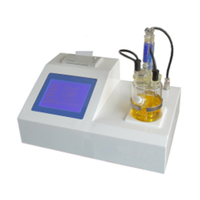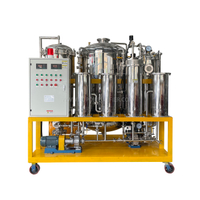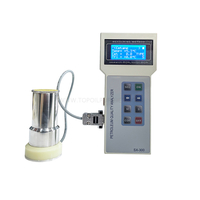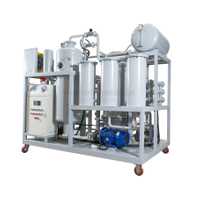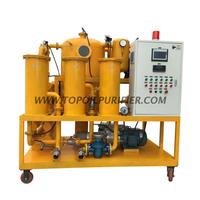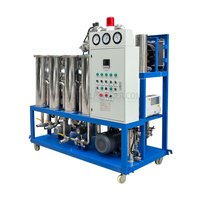Fuel oil filtration systems have become essential for heavy equipment maintenance due to the numerous benefits they offer. These advanced filtration systems not only improve the performance and efficiency of the equipment but also lead to significant cost savings and increased longevity. Additionally, they have a positive impact on the environment, making them a sustainable choice for businesses.
One of the key advantages of using fuel oil filtration systems is the improved performance and efficiency they provide. These systems effectively remove contaminants and impurities from the fuel, ensuring a cleaner and more consistent flow. As a result, heavy equipment operates at its optimal level, delivering enhanced performance and productivity. The filtration process eliminates the possibility of clogged fuel lines or injectors, reducing downtime and maintenance costs.
Cost savings and increased longevity are also major benefits of utilizing fuel oil filtration systems. By removing impurities from the fuel, these filtration systems prevent damage to the equipment's engine and other components. This translates into reduced repair and replacement costs, as well as extended lifespan of the equipment. Moreover, the efficient filtration process helps optimize fuel consumption, leading to lower fuel expenses for businesses.
In addition to the economic advantages, fuel oil filtration systems offer significant environmental benefits. By removing contaminants, these systems minimize harmful emissions and pollutants, contributing to a cleaner and healthier environment. This aligns with the growing focus on sustainability and eco-friendly practices in various industries.
Overall, the benefits of using fuel oil filtration systems for heavy equipment maintenance are undeniable. Improved equipment performance, cost savings, increased longevity, and environmental advantages make these systems an indispensable tool for businesses seeking enhanced efficiency, reduced expenses, and a greener footprint.
Improved Equipment Performance and Efficiency
In today's fast-paced and competitive industrial landscape, businesses are constantly seeking ways to enhance their equipment performance and efficiency. One crucial aspect that plays a significant role in achieving this goal is the implementation of a reliable fuel oil filtration system. This system not only ensures the purity of the fuel being used but also maximizes the overall performance of the equipment.
A fuel oil filtration system is designed to remove impurities and contaminants from the fuel, ensuring that only clean and high-quality fuel is supplied to the equipment. By doing so, it prevents the accumulation of harmful substances that can cause clogs, corrosion, and other performance issues. This ultimately translates into improved efficiency and longevity of the equipment.
One of the key benefits of a fuel oil filtration system is its ability to enhance combustion efficiency. Contaminated fuel can lead to incomplete combustion, resulting in lower energy output and increased fuel consumption. By eliminating impurities, the filtration system enables a more efficient combustion process, optimizing the equipment's performance and reducing fuel consumption.
Furthermore, a fuel oil filtration system plays a crucial role in preventing equipment downtime and costly repairs. Impurities present in the fuel can cause damage to the equipment's internal components, leading to malfunctions and breakdowns. By ensuring that only clean fuel reaches the equipment, the filtration system minimizes the risk of such issues, thereby reducing maintenance costs and downtime.
In addition to improving equipment performance, a fuel oil filtration system also contributes to environmental sustainability. Clean fuel combustion produces fewer emissions, reducing the ecological footprint of industrial operations. This not only helps businesses comply with environmental regulations but also enhances their reputation as responsible corporate citizens.
Cost Savings and Longevity
In today's fast-paced world, efficiency and cost savings are paramount in every industry. One area where businesses can achieve significant savings is in the maintenance and longevity of their equipment. One crucial factor in ensuring the smooth operation and durability of machinery is the quality of the fuel oil used. This is where a fuel oil filtration system comes into play.
A fuel oil filtration system is a vital component of any industrial setting that relies on fuel oil for its operations. This system works by removing impurities, contaminants, and water from the fuel oil, ensuring that only clean and pure oil reaches the machinery. By doing so, it prevents the abrasive particles and harmful substances from entering the engine, which can cause significant damage over time.
When it comes to cost savings, investing in a fuel oil filtration system is a wise decision. By effectively removing impurities and contaminants, the system allows the machinery to operate at its optimum efficiency. This, in turn, leads to reduced fuel consumption and lower maintenance costs. Clean fuel oil ensures the engine components remain free from deposits and corrosion, resulting in extended equipment life and reduced repair expenses.
Moreover, a fuel oil filtration system contributes to the longevity of the machinery. By eliminating harmful particles and water, the system prevents engine wear and tear, prolonging the life of critical components such as fuel injectors, pumps, and valves. This not only saves businesses from the hassle of frequent equipment replacement but also ensures consistent performance and productivity.
In addition to cost savings and longevity, a fuel oil filtration system also has environmental benefits. Clean fuel oil emits fewer pollutants, reducing the carbon footprint of the machinery. This aligns with the growing global focus on sustainability and environmental responsibility, making it an attractive choice for businesses aiming to reduce their impact on the planet.
Environmental Benefits
One of the most important aspects of protecting our planet is understanding the environmental benefits that certain technologies and systems can provide. One such system that offers significant advantages is the Fuel Oil Filtration System. This innovative technology not only improves the performance and efficiency of fuel oil, but it also has numerous environmental benefits.
First and foremost, a Fuel Oil Filtration System helps to reduce harmful emissions. By removing impurities and contaminants from the fuel oil, the system ensures that only clean and pure fuel is used in combustion processes. This, in turn, leads to a significant reduction in the emission of pollutants such as sulfur dioxide, nitrogen oxide, and particulate matter. These pollutants are known to contribute to air pollution and have detrimental effects on human health and the environment. By utilizing a Fuel Oil Filtration System, industries and businesses can actively contribute to cleaner and healthier air quality.
Additionally, the use of a Fuel Oil Filtration System can lead to a decrease in overall fuel consumption. By ensuring that the fuel oil is free from impurities, the system allows for better combustion efficiency. This means that less fuel is required to generate the same amount of energy, resulting in reduced fuel consumption and lower carbon dioxide emissions. With the growing concerns about climate change and the need to reduce greenhouse gas emissions, the use of a Fuel Oil Filtration System can play a crucial role in achieving sustainability goals.
Furthermore, the implementation of a Fuel Oil Filtration System can also have a positive impact on equipment longevity and maintenance costs. Impurities present in fuel oil can cause damage to engines, boilers, and other combustion equipment, leading to costly repairs and downtime. By effectively removing these impurities, the filtration system helps to extend the lifespan of equipment and reduces the need for frequent maintenance and repairs. This not only saves businesses money but also reduces the overall environmental footprint associated with the production and disposal of equipment.
Conclusion
In conclusion, investing in a fuel oil filtration system is a wise decision for businesses. This system removes impurities from the fuel, leading to improved combustion efficiency, reduced maintenance costs, and enhanced environmental sustainability. It brings multiple benefits, including cost savings, increased longevity, and environmental advantages. By removing impurities, contaminants, and water from fuel oil, the system safeguards machinery, extends equipment life, and reduces maintenance and repair costs. Additionally, it offers a range of environmental benefits such as reducing harmful emissions, improving air quality, decreasing fuel consumption, and extending the lifespan of equipment. By investing in such systems, businesses can actively contribute to a cleaner and greener future while also enjoying the economic advantages of increased efficiency and reduced maintenance costs.











